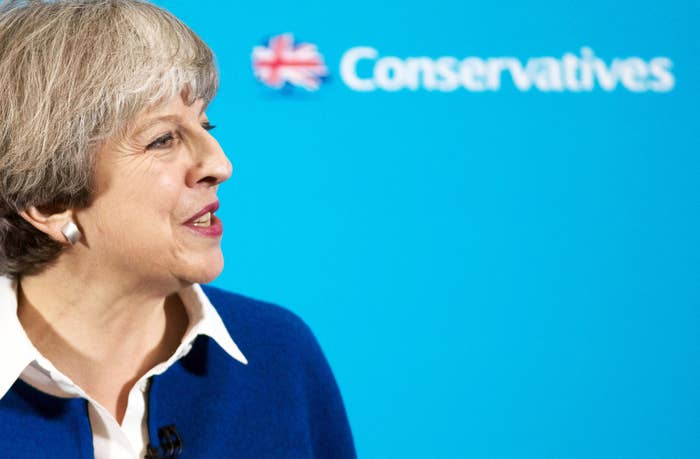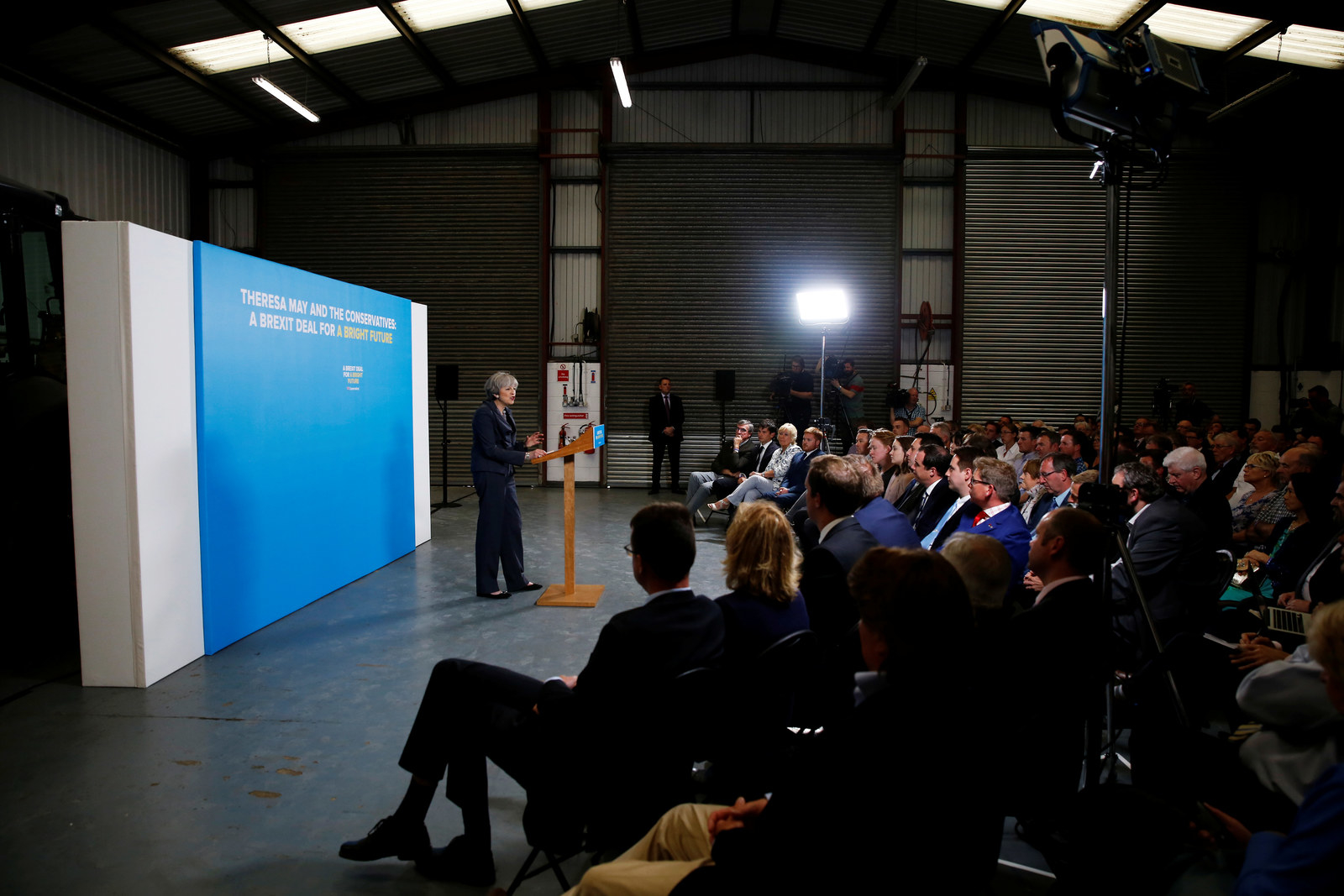
Theresa May was accused of using "cliches and platitudes" to avoid talking about policy, as journalists pushed back against her repeated refusal to give straight answers to questions on the campaign trail.
The day after a BBC leaders' debate in which the prime minister refused to take part, May's battlebus arrived in Teesside where she tried to focus her flagging campaign on Brexit.
Taking questions after the speech, the Conservative leader was given a hard time by members of the travelling media who are growing increasingly exasperated that May seldom gives a straight answer.
"People think there's nothing there," Michael Crick, of Channel 4 News, told the prime minister.
Earlier, May's campaign allowed journalists ride on her battlebus, which some took as an indication that her aides are anxious that the media narrative has turned against them.
Wow! The running battles the (newspaper) lobby had in 2015 to get onto that bus, sure sign Team May are rattled... https://t.co/a35PaMnfeG
May's campaign has been tightly stage-managed since it began last month, with a relentless focus on the leader herself rather than the party and constant repetition of a handful of catch-phrases, including "strong and stable leadership" and "coalition of chaos".
Despite repeated complaints that the campaign has been boring and too repetitive -- and that May isn't telling voters enough about what she plans to do if re-elected for the next five years -- the prime minister has stuck to her strategy.
In Teeside, May said leaving the European Union is "this generation's chance to shape a brighter future for our country".
When journalists tried to press her on details afterward, however, she gave no new information.
Ben Wright of the BBC asked May to spell out the "dire consequences" of leaving the EU without a deal. She accused "people in Europe" of wanting to punish Britain and opposition parties in the UK of being willing to accept a deal "whatever the price".
Emily Morgan of ITV News asked the prime minister how she thought her campaign was going, and whether "in your wildest nightmares" the race would be seemingly so close -- a reference to Labour closing the gap dramatically in opinion polls.
May replied that voters had a "clear choice" about who they wanted to lead the country during the Brexit talks and in the future.
Then came Crick.
The Channel 4 News political correspondent, who was a contemporary of May and her husband Philip at Oxford University in the late 1970s, clashed with May at a press conference earlier in the month after her U-turn on social care. That day, he accused her of being not "strong and stable" but "weak and wobbly".
On Thursday, Crick said: "Is the reason that you’re doing so badly is that whenever people ask you about policy, all we get are cliches and platitudes? And we’ve seen the same today. People think there’s nothing there." Then he asked the prime minister to identify where an additional £8 billion promised for the NHS in her manifesto will come from.
"Well, first of all Michael what we have published is a manifesto that addresses the big challenges that this country faces, not just over the next five years but beyond," May responded. "And we have set out, clearly, some of the hard choices that need to be made and how we will address those challenges.
"You ask about extra funding being put into the NHS. Let’s just look at our record of funding on the NHS."
At that point, there was a commotion in the audience as Crick apparently tried to interject, and May admonished: "Yes, Mr Two Microphones, just wait a minute."
More funding for the NHS would come from having a strong economy, May said. As the microphone moved away from Crick, the journalist shouted: "If the economy goes downhill the money to fund the NHS won’t be there, then."
May shot back: "Well people should vote Conservative to make sure the economy doesn’t go downhill."
Beth Rigby, of Sky News, then asked May to "be straight with people" about how many migrants the country could realistically accept each year without damaging the economy. May did not give a figure.

Reporters from Tory-backing national newspapers also tried to grill the PM on her campaign missteps, but the answers were no clearer. Harry Cole, of The Sun, asked whether she was worried that "your campaign messaging is all over the place and gives off a slight sense of panic"?
May responded with an attack on Jeremy Corbyn. Voters have a "very clear choice" at the election, she said, adding: "Who do they think has got the strong and stable leadership to take this country into the future?"
The Daily Telegraph asked May why her double-digit lead in the polls had apparently evaporated. She responded with her stock answer on this question – the only poll that matters is on 8 June – before repeating her line about "me and my team having that strong and stable leadership" to lead the country through Brexit and beyond.
Even on softer questions, the PM appeared to stick to scripted answers. A reporter from the Daily Mail asked whether she agreed with foreign secretary Boris Johnson's assessment that the audience at Wednesday night's BBC leaders' debate was too left wing.
May has been widely criticised for refusing to take part in the debate, with home secretary Amber Rudd being dispatched to represent the Conservatives instead.
"Well what I think about last night's debate is that Amber Rudd did an absolutely excellent job," the prime minister replied.
Had May actually watched the debate? the Press Association asked.
"As I say, I think Amber did an excellent job in that debate."
Will Rudd be made chancellor after the election?
I'm focusing on the election, May said, adding that voters faced a choice between Corbyn and the "strong and stable leadership which will take us to that brighter future".
May's tense Q&A with the national press comes a day after she was accused by the Plymouth Herald of avoiding its questions during a campaign visit to a marginal seat.
The newspaper said it was given five minutes in which it got to ask four questions -- and none of the answers was illuminating.
Asked whether May's government would honour previous commitments by the Conservatives to improve the region's transport links, the prime minister said: "I'm very clear that connectivity is hugely important for Plymouth and the South West generally. That's why we have been putting money into infrastructure it's important to develop the economy and we will continue to look at plans to help improve the connectivity down to the South West."
"She had and given me absolutely nothing," Sam Blackledge, the Herald's chief reporter, said of the interview.
Starting to think that reading interviews with Theresa May could be a good non-chemical cure for the insomnia I've been suffering from.
Conservative aides are sensitive to being accused of keeping the media at arm's length during the campaign, arguing that May has repeatedly sat for interviews while her main rival, Corbyn, has largely avoided interviews with local and national newspapers during the campaign.
It is true that Corbyn has done few interviews with the press and there have been frustrations among those covering his campaign. But May's failure to answer questions, repeated use of soundbites, and refusal to admit her U-turn on social care was a U-turn has alarmed many of the journalists covering her.

